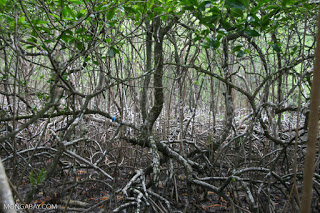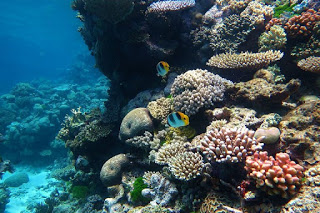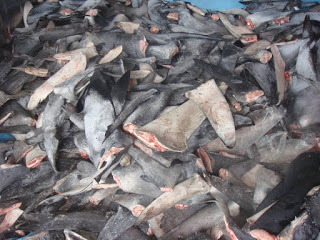 To protect its coral reefs, Hawaii is the first state to pass legislation banning sunscreens that contain ingredients known to harm coral. It is now up to Gov. David Ige to sign the bill into law. The two chemicals, oxybenzone and octinoxate, can trigger coral bleaching and act as endocrine disruptors. Skin-care companies object to the proposal, which would force them to reformulate their sunscreens. “Overwhelming scientific evidence shows that excess sun exposure without effective sunscreen increases the risk of developing skin cancer in both adults and children,” said an industry statement. “Banning oxybenzone and octinoxate — key ingredients in effective sunscreens on the market — will drastically and unnecessarily reduce the selection of safe and effective sunscreen products available to residents and visitors.” Consumers don’t need to wait for the debate’s results to protect coral; see Vogue magazine’s guide to shopping for coral-safe sunscreen here.
To protect its coral reefs, Hawaii is the first state to pass legislation banning sunscreens that contain ingredients known to harm coral. It is now up to Gov. David Ige to sign the bill into law. The two chemicals, oxybenzone and octinoxate, can trigger coral bleaching and act as endocrine disruptors. Skin-care companies object to the proposal, which would force them to reformulate their sunscreens. “Overwhelming scientific evidence shows that excess sun exposure without effective sunscreen increases the risk of developing skin cancer in both adults and children,” said an industry statement. “Banning oxybenzone and octinoxate — key ingredients in effective sunscreens on the market — will drastically and unnecessarily reduce the selection of safe and effective sunscreen products available to residents and visitors.” Consumers don’t need to wait for the debate’s results to protect coral; see Vogue magazine’s guide to shopping for coral-safe sunscreen here.
—————————————————
A new study found that mangrove forests store more carbon than researchers realized. Mangrove soil stored around 6.4 billion metric tons of carbon in 2000. Mangroves cleared between 2000 and 2015 — often for fish farms or wood fuel —released up to 122 million tons of carbon. “Protecting, enhancing and restoring natural carbon sinks must become political priorities,” says Jonathan Sanderman of the Woods Hole Research Center. “Mangrove forests can play an important role in carbon removals because they are among the most carbon-dense ecosystems in the world, and if kept undisturbed, mangrove forest soils act as long-term carbon sinks.” Add climate change mitigation to the list of mangroves’ estimated $2.7 trillion in environmental services, along with storm surge protection and serving as fish nurseries.
3. Australia to Invest $379 Million to Protect Its Great Barrier Reef
The Australian government has announced that it will make its biggest investment yet to help the besieged Great Barrier Reef. “The Great Barrier Reef is a natural wonder of the world, supporting tens of thousands of jobs through Queensland,” wrote environment and energy member for this soil is long-term Josh Frydenberg in an April 29 op-ed announcing the measure. The funds will be directed toward efforts to reduce agricultural runoff, research coral resilience and adaptation, and control coral-eating crown-of-thorns starfish. Australian scientists applaud the move, but some are concerned that it targets less-than-successful approaches.
—————————————————
4. Plastic Straw Bans: Is the Travel Industry Missing the Boat?
Bans on plastic straws are gaining momentum around the world, but some travel companies are lagging. “Plastic straws kill marine life and choke reefs and beaches, never decomposing completely, but instead breaking into bits of microplastics, which eventually enter the food chain. And so the straw — ubiquitous in most restaurants, bars, cruise ships and luxury resorts — has become a prime example of how tourism can have a deeply negative effect on the environment.” Many independent hotels and some chains like the Four Seasons, have banned the straws. Marriott, the world’s largest hotel chain, has launched an ambitious program that will eliminate plastic shampoo bottles as well. With much of the $7 trillion global travel industry dependent on clean oceans, it’s a no-brainer for travel companies to jump onboard.
Read More…
Miami’s glittering image as a cosmopolitan international hub is being tarnished by its new dubious ranking: it’s the nation’s top importer of shark fins. Twelve other U.S. states, including two with competing ports, New York and California, have banned the imports. “Although the practice of slicing shark fins off at sea — called shark finning — is outlawed in the U.S., shark fins can still be legally harvested from sharks brought onshore or imported from countries without finning bans. It’s also likely that lax regulations in Malaysia and Hong Kong, which import more than 350 times as many fins as the U.S., mean fins from endangered sharks are winding up in American markets.” The conservation groups are pushing for a federal ban on the imports.
 Scientists working in New Caledonia have detected the presence of six shark species feared gone from the archipelago, including great hammerhead and bull sharks, by simply sampling the water. “By testing samples of water collected from the region, the scientists detected six shark species that had previously been missed by nearly 3,000 dives and 400 baited video traps.” The scientists were able to use DNA left behind in feces, mucus, and skin scraps. This breakthrough could change the way biologists assess — and protect — marine species at risk.
Scientists working in New Caledonia have detected the presence of six shark species feared gone from the archipelago, including great hammerhead and bull sharks, by simply sampling the water. “By testing samples of water collected from the region, the scientists detected six shark species that had previously been missed by nearly 3,000 dives and 400 baited video traps.” The scientists were able to use DNA left behind in feces, mucus, and skin scraps. This breakthrough could change the way biologists assess — and protect — marine species at risk.
Be sure to “LIKE” http://facebook.com/SeaSave to ensure our “Week in Review” is delivered to your newsfeed every Friday.
Sea Save Foundation is committed to raising awareness of marine conservation. The Week in Review is a team effort produced by the Sea Save staff to provide a weekly summary of the latest in marine research, policy, and news.








